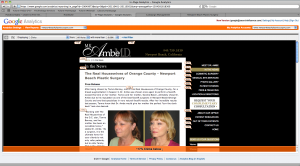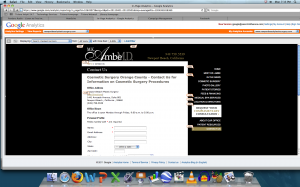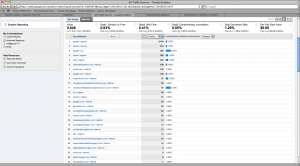Marketers Like Us – How I’ve Learned to Stop Worrying and Love Having No Privacy
May 3rd, 2011 by
Not too long ago, I was completely ignorant of any tracking on the internet. I thought, like many, that the things I did online were solely known to me and wouldn’t affect anything. I thought that “Private Browsing” really meant that, and that no one else would know or care that I played a bunch of flash games and that I worked in whatever field I did.
Flash forward to now — I’ve had a whopping year of intensive exposure and training in Internet Marketing: found out what Facebook is really for; why Google might not even find the site I’m looking for; what Google is doing in my status bar, even if I typed in the url; how Google’s ads knew exactly what I typed; that Google’s rankings are always in a state of flux; and even how I like to see the pages I visit. In short, entering this job totally changed how I look at the web.
And I’m happier for it. Sure, people are always trying to create some kind of “Google is Watching You” zeitgeist, whether through their use of AdBlock and Ghostery, or by bringing up the problems Google’s had with European trade officials, or how much Google’s search results have changed since the last time they noticed. People seem to be concerned that someone’s watching their online habits specifically. But I’m now the person who’s watching, and I know how and why I’m doing it.
To be fair, everyone who’s “invading” privacy is watching online habits. It’s easy to say it’s on a “macro” level, but it’s harder to convince some people that it’s more like an ant farm than an investigation. For internet marketers, not only is it simply not profitable to look at the individual, but it’s becoming less feasible and less legal to do so.
Firstly, targeted marketing based on internet behavior isn’t an unregulated free-for-all on your personal information. 2009 brought a proposal from the FTC for seven “Self-Regulatory Principles for Online Behavioral Advertising,” outline in this Interactive Advertising Bureau report. But for this discussion, it’s important to note that the regulations do not affect collection of data “solely for [the website’s] own uses,” or for contextual advertising like Adwords, “as it delivers advertisements based on the content of a Web page, a search query, or a user’s contemporaneous behavior” — the two main ways marketers use your data online.
What most marketers are concerned with are those non-regulated uses. Google Analytics, found 39 times more than the “average” tracker on the web, is largely for the company’s own use. Google, still the top dog for internet searches, puts its contextual ads right next to its search results — a strong source of revenue for its advertisers.
Analytics, despite privacy advocates’ concerns, is nothing to be afraid of. It’s only to make sites more responsive to their users. One of the greatest tools for the company owning (or managing) the site is to know how people actually use their site. Certainly, most hosting packages do this in a rudimentary way, but few have the immediate gratification of being able to see the site alongside what links are clicked.
The In-Page Analytics shows the percentage of clicks to the various pages in little pop-ups next to each link. Of course, it’s only tracking links to the page, so you have to take it with a few grains of salt if you have contextual linking on the page, but it gives site owners and especially ad campaign runners an idea of how to make their choices more relevant to browsers. The page below shows that almost 2% of visitors hit up the contact page from here, and another view shows us that a fifth of the people visiting the contact page complete a form — whether that’s good or bad is for the marketer to decide, but that information is certainly useful. Should that information not be in the hands of small businesses? The 12000 people searching for “block javascript” in Google think so.
And what about those 12000? How can I know that? Because Google “betrays” its users privacy and gives vague estimates of how much people search for various keywords. Again, this helps small businesses without walls of supercomputers to better gather data so that they can garner a little bit of information to better serve their customers.
Finally, what about pages you visit that aren’t part of the site you’re on? Why would a site owner want to know that? Surely, they couldn’t want to know what page you were on before this one! But the internet is the ultimate word-of-mouth; “Who referred you?” becomes “From where were you referred?” and unfortunately, people just don’t pay enough attention to notice effectively on their own.
So instead of ineffective tools and sheer guesswork, the visitor loses a little privacy to help small business owners understand how people came to their site and make it better for those visitors by tailoring the content and design. And this is the mindset behind any loss of privacy for the visitor. Marketers like us aren’t trying to figure out who specifically visited our site and did what — if we were, we’d use other tools that can’t be so easily blocked, and would only be used for malicious visitors.
While some might call it “drinking the Kool-Aid,” I’ve understood more deeply why losing just a little privacy and not trying to circumvent analytics and other tools are a boon for the whole Internet — making it more valuable to the visitor, so that sites give to the reader what they really want. Stop worrying, and support your small businesses on the web.










Great post Doug,
For years I’ve been saying that privacy is just an illusion anyway.
The reality is, if they’re motivated enough they can find out anything.
It’s a good argument for keeping one’s nose clean 🙂
Doug, I had no clue you wrote this – it was a really good piece.